Disruption Fatigue: What Happens When Disruptors Get Disrupted?
A friend was lamenting the disruption in daily meals in the city when trying to order a wok-fried udon and found they did not accept cash or credit card, seriously? And there is little doubt about it when you enter a certain burger shop and a team of “waitresses” (technically not waitresses because they do not serve or take orders) point you to 3 touch screens but somehow you cannot find the burger that is advertised outside (because it is yet not loaded into their system). And no, the bunch of waitresses cannot take voice orders so no one would be having that burger that day.
Oh, in a gross violation of your privacy, you will have to scan your receipt into this camera which could be recording your face (which means they will have your credit card details and face ID too) before the glass cubicle door pops open for you to collect your food. Don’t bring cash—no food for you and forget about any special requests because behind the walls are a bunch of humans who will be reading or misreading the order.
What will we do? Boycott and eat less?
Disruption has been wonderful because Redmart has saved us the trip to the supermarket and the checkout counter, hours of valuable time gained only for us to spend hours browsing through 60,000 items listed on their virtual aisles.
Netflix saves us valuable hours of irritating commercials, Deliveroo banishes the queues and the travel time, and GRAB cabs eliminate the need to search for parking and the pain of navigating atrocious traffic conditions caused by private hire cars and food delivery services thus, enhancing our overall quality of life.
The earliest disruption in modern history would have been the invention of the printing press 500 years ago and was blamed for circulating “fake news”. Radio in the early 1900’s was blamed for everything from bad economy to poor grades, robbery, drought, bad skin and all.
Who still remembers the payphone before it became a cell phone, then the cell phone with a camera and internet and games till the smartphone arrived?
What about the PC and laptop? Internet Relay Chat and email addresses when pagers were thriving, all of which have been conquered by Skype, Whatsapp and whatever.
TV, magazines, newspapers, dairy companies, diamond companies, shopping malls, banks and even meat farmers are under threat from streaming companies, online media, online shopping, alternative meat, online banks and more.
Frankly, we are exhausted. Just as you sign up for a new payment app, another pops up and now you can enjoy nearly 25% off (unverified) if you pay with FAVE pay which you then pay off with GRAB pay and finally pay the GRAB bill with your UOB ONE card. Wow, such savings. Who is paying that 25%?
We are not sure but it could be the restaurants (because we hear that food delivery companies charge up to 30% or more per order) because of rental overheads, staff costs and the commissions to pay for installing all these payment systems and to the food delivery companies.
 Source: ST
Source: ST
Or perhaps it is the disruptor raking in losses for the sake of disruption? Such as homegrown startup fallen stars like Honestbee?
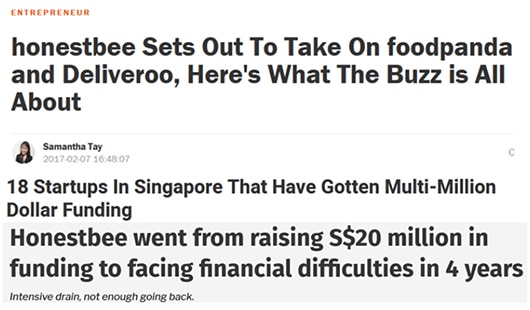 A melange of random headlines
A melange of random headlines
The mind gets jolted at the sight of an Ofo bike and we wonder about the bike-sharing disruption we had before the PMD crisis in Singapore and wonder about the 90,000 Ofo bikes in Singapore landfills as industry pioneer Ofo battles bankruptcy in 4 years (just like Honeybee’s 4 years) as Singapore’s own bike-sharing start-up Obike went bust last year.
We shall not have that problem, we suppose, with MAS-approved robo-advisor Stashaway (that everybody is talking about) which purports to invest in ETFs and/or manage cash (with just a 99% chance of not losing more than 1.7% in your cash account although your deposit is not guaranteed under the deposit insurance scheme). They are smart enough to be sniping away at the banks and fund managers without giving away too many freebies just like Softbank and UBER-backed (still loss-making) GRAB will probably turn to profit sooner than UBER will, venturing into payday loans for their 2.8 million-odd drivers and payment apps (see above). Yes, loans at effective rates of near 15% and more could be a valuable source of revenue.
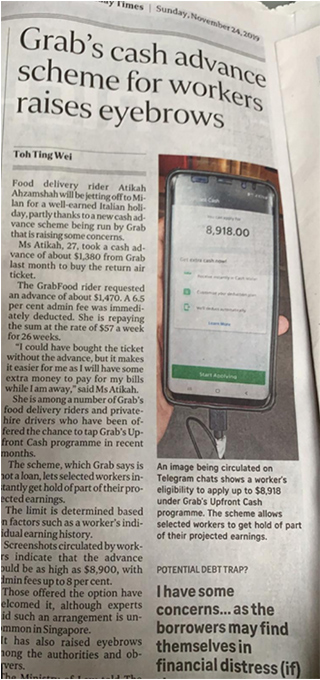 Source: ST
Source: ST
It could be a source of relief for poor old Softbank after the massive WeWork IPO fiasco which is good news for would-have-been investors as WeWork reported a record loss again just last week, with losses doubling to US$ 1.5 billion (a quarter) for a company initially valued at US$47 billion before slashing its valuation to US$ 20 billion before shelving its IPO in September causing Softbank to take a US$9.2 billion write down of its US$10.3 billion investment, to date, only to top it up with a US$9.5 billion rescue package in October. Better Son’s loss than the man on the street.
Yet, it is not just WeWork the disruptor that was disrupted.
UBER, another major Softbank investment, which threatened never ever making a profit before its IPO in April, saw its founder dumping more stock (nearly all) this week (nearly US$1.5 billion worth since IPO) and of course, and continues to post losses like WeWork “on Wheels”, as the Telegraph puts it and makes Oracle billionaire Larry Ellison look like a genius in September for calling both UBER (IPO $45 vs current $29.56, -34%) and WeWork “almost worthless” because they have “no technology and no loyalty” and both do not own their buildings or their cars, which makes it rather “bizarre” to claim they are technology companies at all.

 Source: Barrons
Source: Barrons
Blame Tesla, for Tesla has taught markets that startups, albeit a real technology startup, never record annual profits despite its profitable quarter in Q3. Only 1 of its 4 ever profitable quarters ever since its IPO in 2010 with shares returning 1,800+% since (IPO $17+ vs current price $333), although we would hesitate to comment further because we are not sure how this viral clip of Tesla’s “shatterproof” windows managed to somehow shatter (but did not break) in this live demo this week for it to go down in history as another iconic auto tech meme.
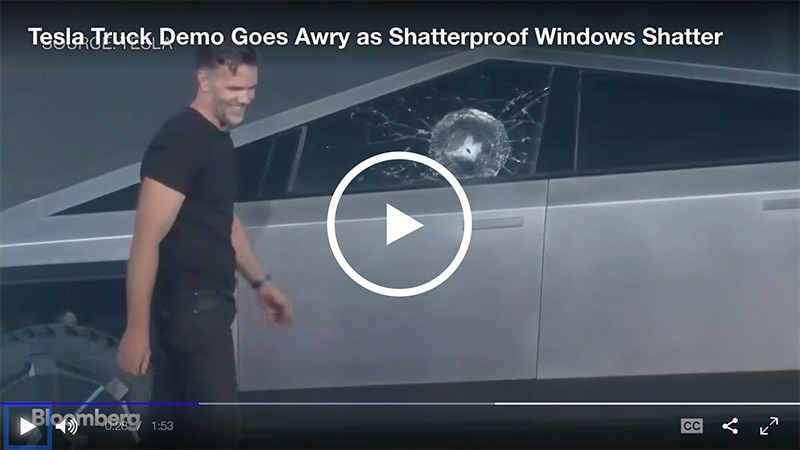 Source: Bloomberg
Source: Bloomberg
Yes, disruptors have done well to disrupt but if recent months tell us anything—it is no longer about being bought out. Like do you really expect Disney to buy out Netflix? But perhaps Nike will buy out US$2k exercise bike company Peloton (IPO $29 Sept vs current $29.36) and/or sportswear company UnderArmour (peak $51 in 2015 vs $17.43 current)? Or that Wholefoods will buy Impossible and Beyond Meat eventually?
 Source: Barrons
Source: Barrons
If anything now, Disruptors prepare… to be disrupted!
Disney and Apple TV+ are both going for Netflix after over a decade of tolerating disruption. Yet, Disney shares soared to a record high after Disney+ reached 10 million sign-ups on its first day of launch despite some hiccups on their service quality. As it is, Netflix is facing investor lawsuits for the subscriber shortfalls.
The pot (marijuana or CBD) bubble is bursting as many cannabis companies lose two-thirds or more of their value since their flamboyant rise 2 years ago and we end up with WeWork-like layoffs with WeWork laying off 19% of their employees this week.
The drone bubble has been bursting since last year with the fading of its hype even as new technology millionaires are being created daily, while Walmart projects billion dollar-losses in its e-commerce foray with no one learning from meal start-up Blue Apron (IPO 2017 $10, current $0.708, -93%).
Maybe, just maybe, it is not about disruption but about disruption fatigue because we are glad we have not bought into the Amazon Echo or Google Home hype as hackers can use lasers to hack into them to unlock your cars and doors just as Chilean protestors brought down a police drone with lasers.
 Source: Wired
Source: Wired
Disruption of the disruptors?
Perhaps it is because we are not going to eat another Beyond Burger or Beyond Mince or Impossible-whatever, after giving them a try. It is really too expensive anyway and we can reduce our carbon footprint by just driving less and using less food delivery services (for the love of the excessive plastic packaging in all the take-outs) even though their stock price is still +200% since their IPO peak of +836% as Impossible Foods face lawsuits of contamination by meat and why are we not eating meat because ground beef prices have been free-falling since?
It is O.K. as a user to use FAVE Pay, really and get free Food Panda deliveries as long as you are not the investor burning for it. As an investor, perhaps it is time to start asking what value are you getting for your investment—see joke below.
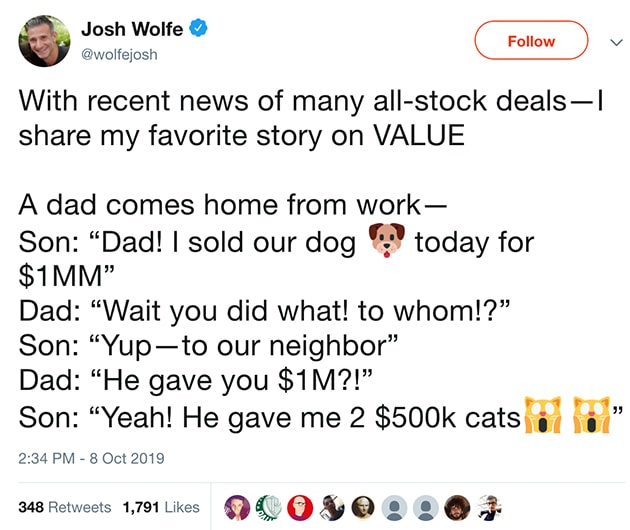 Source: Josh Wolfe on Twitter
Source: Josh Wolfe on Twitter
For instance, does cheap food delivery and free food delivery make sense, as people are asking now? Or should it be marketed differently?
 Source: Bloomberg
Source: Bloomberg
 Source: Mothership
Source: Mothership
As it stands, investors globally have started to wise up and starting to question if IPO’s are really about the technology or bad-tech with a disloyal user base (to paraphrase Larry Ellison).
 Source: Business Insider
Source: Business Insider
So much for disruption but we really can live without the radio these days. But we are exhausted so let the disruption meltdown begin!
Afterword
We have given up on Redmart and feel more liberated because we do not want to kill our eyes poring over 60,000 product offerings. Instead, walking down the aisles of Cold Storage is really quite soothing because the crowds have lessened. Don’t make us download another payment App because we had quite enough of trying to catch the next free Starbucks coffee. We are lucky we still do not have to choose between Netflix and Disney in Singapore just as we have not watched Channelnews or TV in years (because we will not pay for a digital antenna). We will, as much as we can, not support GRAB and Deliveroo and gang because we hate what their drivers are doing on the road. We will also not eat from any place that requires some e-wallet payment or payment App because we don’t wish to compromise our privacy by registering on any new app that promises us a discount. And we squirm on the idea of new smart building facial recognition entry scanners.
As it is, the kids are giving fake names in Starbucks because they are not comfortable with the stress of being called out although it will be a matter of time before facial scans are required before you even order and eat and it would not be a surprise at all when it happens because the world would be a better place by then and possibly ready for a disruption in consciousness when we create a Telepathy app?
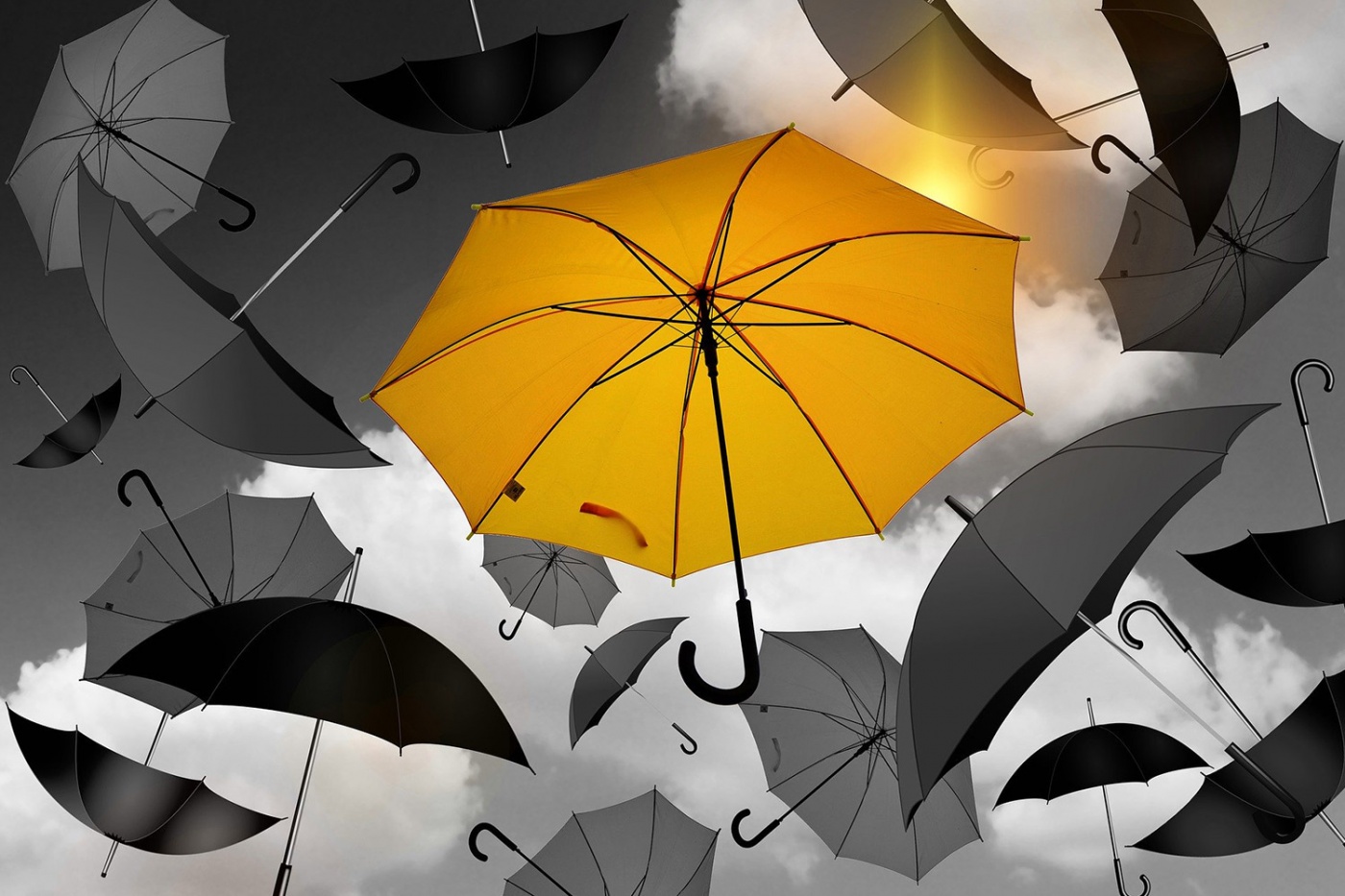
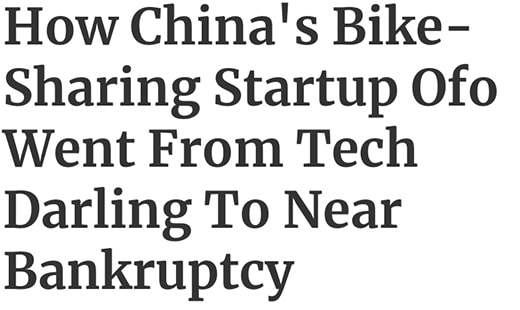
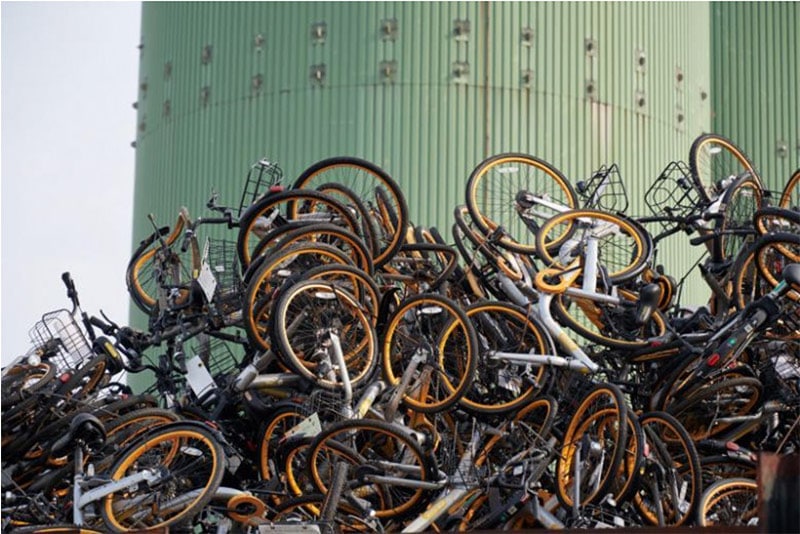 Source
Source
